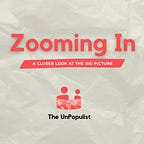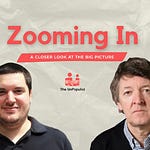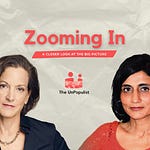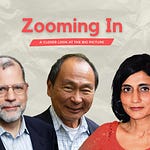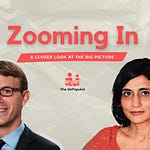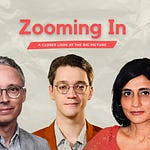Aaron Ross Powell: Politicians love to stress the need for “law and order,” and most Americans are on board with that. But the phrase rings rather differently in middle-class suburbia than it does in those communities most subject to the heavy hand—or fist—of the law. To explore what law and order looks like in African American communities, I’m joined today by Stephen Henderson. He’s the host of NPR’s Detroit Today and Detroit Public Television’s American Black Journal. Before working in TV and radio, Henderson won a Pulitzer Prize for commentary for his writing at the Detroit Free Press.
The following transcript has been lightly edited for flow and clarity.
Aaron Ross Powell: What does the phrase “law and order” mean in Black communities in a way that’s maybe different than what, say, suburban white progressives think of when they hear that?
Stephen Henderson: As with all things, history is important when you think about the way that people receive messages today or hear things today. When you talk about Black communities and that phrase, “law and order,” the history there is pretty awful. Some recent history: Of course, the war on drugs that escalates during the 1980s in particular has an outsized effect on African Americans and African American men in particular. We can debate for a long time the merits of drug use and drug selling, but the way in which the drug war targeted African Americans differently, I think, is the thing that stands out in African American communities.
If you go back just a few decades before that to the 1960s, the phrase law and order was used over and over again, particularly in the South, in answer to the calls for respect of full citizenship for African Americans. “Law and order” was used as a way of justifying police brutality against civil rights protests and protesters. It was the way in which some pretty prominent anti-civil rights figures mustered support for their position: The idea that the things that were changing and the things that were being asked to change would lead to a breakdown of law and order. That’s another historical point.
If you go back even further to the end of the Civil War and the Reconstruction period, there’s a violent pushback to Reconstruction, to the efforts to make full citizenship a reality for African Americans in the South. “Law and order” is the phrase that gets invoked time and again as a pushback to that—that Black freedom, Black voting, Black community-building and business-growing were somehow threats to this idea of law and order. In fact, the origin of the Ku Klux Klan finds itself mired in this phrase and this idea that there’s a law and order that mandates Black inferiority in order to be maintained.
I think those are all things that as African Americans we grew up hearing about and learning, but they’re also the things that we experience. Here in the 1980s in Detroit, I was a teenager and getting my first taste of the kinds of freedoms you get as an adult: driving a car, riding around in cars with people. The fear we had of Detroit police back then, and in particular the “Big Four,” which was a squad of plainclothes policemen in unmarked cars who rode around and pretty much did what they wanted—we knew who that was, and we knew what kind of trouble we might face no matter what we were doing if we came across them. It’s a phrase that invokes all of those things, both historical and contemporary, that suggests that that’s about targeting us in a way that heightens and enhances the notion that we are not equal citizens.
Powell: As you were saying that, it put me in mind of a passage from a speech that Bill Buckley gave in 1965 to New York Police Department officers that I come back to all the time as representative of this view that sees, basically, a social hierarchy that has, certainly in 1965, Blacks at or near the bottom as indicative of order and indicative of the way that civilization just naturally ought to be. Again, he’s talking to New York police officers in 1965 about civil rights protests, and this was a time when, let’s just say, Black Americans had reasons to be skeptical of cops. He says, “Every age in which values are distorted, an age like our own, in which truths are thought either not to exist or as to exist only as quaint curios from the dead past, the wrath of the unruly falls with focus on the symbols of authority, continuity and tradition.”
It feels like you see an element of that even today in terms of—I watched a lot of people during the George Floyd protests, a lot of people who were extremely sympathetic to the argument that police were brutal and needed reform, that they acted in really awful ways to marginalized communities, and so on, but as soon as the protests were large enough that they were, say, blocking traffic, that there was a little bit of violence on the margins of them, it was all of a sudden, “No, what we need is law and order,” and a viewing of basically traditionally marginalized, underprivileged people asserting themselves as representative of not justice, but disorder. It just seems to trap a lot of even well-meaning people’s thinking that the moment the struggle for liberty becomes a little bit unruly, we need to clamp down on it.
Henderson: Yes, and again, that’s tied to this history and this idea of what place African Americans are supposed to occupy in our country. A lot of this is subconscious. As you point out, a lot of well-meaning people are still raised and socialized in a culture that has all of these markers of inequality baked into it, and so the assumption is that that’s the way things are supposed to be. Somebody who’s pushing back against it is disrupting that structure, and that structure then, of course, becomes synonymous in the narrative with the idea of law and order—that as long as that structure is in place, we’re all safe or fine.
It was interesting during the George Floyd protests how exercised people got and how much was made over those protests and what they looked like. I’m the first one to call out people who take advantage of legitimate protest and demonstration and act in ways that are inappropriate or illegal, but there was so little of that, really. If you were out in the streets and watching what was going on, there was less of that there than we saw, for instance, on Jan. 6, 2021, when a real mob attacked the Capitol.
A lot of the folks who defend the people who felt aggrieved enough to do that also feel as though African Americans and their allies who were protesting the police didn’t deserve that sympathy. But again, it is about the way in which we’re trained to see Black people and Black causes. There is this defaulting to the idea that the structure that we live with today is the right one and the one that must be protected, and it’s law and order that preserves that.
Powell: How much of this is race versus class? I ask because the Tyre Nichols murder has been—and the response to it has been—in the news a lot lately, and particularly among the right, you see this narrative that this didn’t have anything to do with race because the perpetrators were Black. Is what we’re seeing really about race, or is it about the fact that Blacks happen to be the lower-status group, and so it’s about lower-status groups asserting themselves?
Henderson: On one hand, I always think that’s a totally legitimate question to ask, because there are really great substantive answers to it. At the same time, I always hesitate, because I think posing it as an “either-or” leans into some of the real complication around the distinctions that we try to draw in our society. Yes, poor people in America suffer from a form of inequality that we can document and discuss, and that many of us, depending on the community that we live in, can see on a daily basis.
I spent the first two and a half years of my career working for a newspaper in Lexington, Kentucky, the Lexington Herald-Leader, which covered not only Lexington but all of Eastern Kentucky back then. I’d grown up in Detroit, which in that era, was kind of ground zero for urban poverty and the growth of urban poverty, but the things that I witnessed in Eastern Kentucky—and I spent a lot of time in what we call the coal counties, places that had real isolation and deep poverty kind of combining to keep people in this intergenerational cycle of being locked out of opportunity—it really taught me a lot about how that kind of inequality plays out. These were white people who suffered from the same kind of lack of opportunity that I see in other places.
So yes, class matters in America, but so does race, and to the extent that they aren’t distinct in some way is right. African Americans are overrepresented among poor people in America, and so it’s hard to draw that distinction, but there are some things that we can talk about that make it different to be Black than it is to be poor, and the beating of Tyre Nichols I think is a very good example.
My answer when people say, for instance, that this happened at the hands of Black officers, and so that’s not racist, is that that leans into the idea that racism is about individual action and individual agency and not about systemic policy—that the idea that Black cops are Black and therefore distinct from white cops in their actions is somewhat of a fallacy in a society that has institutions like policing that are imbued with this idea of Black inferiority.
The police who did that, when you watch the video in particular, you see them essentially mimicking the very same behaviors that you would see from a group of white officers reacting to Tyre Nichols and what he’s doing—this idea that what he was doing was defying their authority, that he was somehow not complying with their superiority over him. Those are institutional motivations, and they explain I think why those police officers didn’t see him as another Black man. They saw him as an opponent of their authority.
All of us in this society, whether we are well intentioned or not, are products of this almost 250-year experiment that has fallen way short of the idea of equality among races. We’re all products of a system that assigns less value to Black lives than to others. We’re all susceptible to behavior that reflects that, often in a subconscious way or an unintentional way.
So there is a problem with poverty. There’s also a problem with race. Sometimes they converge and are indistinguishable in the moment, because they’re both playing out in a particular situation, but I don’t think that that poses them as an either-or construct. They both operate independently, and they both can operate together when the situation invokes them both.
Powell: When you said that they were reacting—“they” being the police officers who murdered Tyre Nichols—were reacting to him, or at least the perception of him, not following, not obeying their authority, it seems a lot of what we see in the way that people think about law and order is a mistaken conflation of authority and order—that authority and respect for authority is both how you get order and to some extent what it means for there to be order.
But in a lot of these cases—you described the plainclothes unit drifting through the streets, and we had a similar instance with this unit disbanded in Memphis after the Tyre Nichols thing—that authority is almost anathema to order. How does that play out in these communities? Because it seems, in a lot of cases, that having these kinds of cops who are acting from a position of authority and enforcing it brutally actually leads to disorder. I’m thinking you’re not going to trust the cops as much; you’re not going to them for help when you actually need it, and so on. Do we have that kind of feedback loop?
Henderson: Sure. Part of the problem is, again, that the idea of order becomes synonymous with this idea of compliance with whatever those who have been given authority to enforce order decide they want to do, and that’s a false sense of order. It’s false in the most important way, because it’s an order that is imagined and enforced outside of the community that it’s being enforced against.
All of us as Americans want to live with a sense of order. We want predictability. We want safety. We want to be able to walk out of our homes and go to school or go to work or go to recreate without having to worry about being safe doing that. If you start with that as the premise that’s worth defending, I think it would be hard to get to, logically, the kinds of things we see police often doing in our society.
This idea of a “Scorpion Unit,” which was the name that they gave to the one in Memphis: What was it that they were doing that was about that kind of order? Or was it just about enforcing this idea that if the cops tell you to do something, you’ve got to do it—if the cops think you’re doing something wrong, you must be doing something wrong? I think we’ve lost that connection in a lot of these communities.
Now, a lot of people are saying that we never had it—that the entire intent behind policing was always some form of subjugation. Certainly, it was in some ways at the very beginning.
But I do think that there was a stretch of time in American history where things were not as starkly disconnected from what I’m talking about in terms of policing and what police were actually doing. We have reached a point, I think, of sliding back to this really raw notion of authority itself being worth protecting, as opposed to order trying to be defined and then enacted. And I think they’re different. Authority and order aren’t the same thing, but we’ve come to conflate those two things when it comes to policing.
Powell: What do we do about that, then? Because obviously the system as it exists now, and in cities around the country, is not just not working, but is in many cases monstrously unjust, destructive, violent, inhumane and so on. Among a lot of people, there is a recognition of this. There are certainly people who deny this, or there are people on the fringes who embrace it, but a lot of people recognize that there is a significant problem.
However, we have this problem with the conflation of authority in order. We also have a problem where anytime we try to have even minor meaningful reforms, like a reform-minded district attorney comes in and tries to clean up a police department, the police are incredibly powerful culturally and politically. The media, even mainstream or center-left media, often, perhaps inadvertently, takes the police side, uncritically reports what they say, highlights handfuls of instances of disorder and violence.
This seems to be an environment where fixing this problem, which has its roots as far back as American history goes, is awfully difficult. What do we do?
Henderson: That’s such a big question. I’ll start with the conversations that I’ve been having here in Detroit with folks who want to “defund” the police. I don’t count myself as part of that community. I think, at minimum, it’s a terrible name in terms of messaging, because it implies something that I don’t think even the most ardent believers in it actually want to have happen, which is the idea that you’d have no way to keep real order.
But when I talk to them about what it is that they want to see, the most common thread is a return to the idea that communities need to be the drivers behind these ideas of, What is order? What is safety? What is worth protecting—and how do we do that? And in some cases, what they would say is that if you started there, you would never end up with a police department in the sense that we know it now.
I guess I don’t necessarily agree with that, but I do agree with several other things that they talk about as being central to kind of a rethink of all of those things— emphasizing the things that actually matter and are threats to people’s sense of safety and order. If you grew up in a city like Detroit even today, let alone when I was growing up in the ’70s and ’80s, which I think were a more dangerous time to be a Detroiter—but even today, there are things that we need taken care of.
We need to protect citizens from crime, from violent crime, from theft, from all kinds of things. These are ills that actually exist, and they exist in greater number in some ways in urban neighborhoods because of the poverty and the lack of opportunity in this intergenerational dynamic that we’ve created over the last 40 or 50 years, which I think has really, really made it much more entrenched.
If you start with those ideas, then the question is, How do you preserve them? I think we’re seeing some interesting ideas out of that community: the idea that the police don’t need to respond to everything that we think of as disorder. Maybe it’s that we need mental health workers. Maybe it’s that we need social workers. Maybe it’s that we need other kinds of medical health support for people.
The crises that occur in people’s lives and bring the police are so broad in scope these days. It’s anything. Anything at all that goes wrong, you dial 911 and they send the police. The police aren’t even trained to manage most of that. In many cases, because of what they’re trained to do, they respond in a way that escalates rather than de-escalates the situation. That’s how we end up with these horrific examples.
I think if you can rethink from the level of a community—it’s a hyperdemocratic idea to say that policing a community should come from the community itself, rather than from a government authority that is somewhat disconnected from those communities. I think that’s where we start.
We’re seeing some of that happen even in the city of Detroit. They are ramping up the efforts to pair police with other kinds of supports: Yes, they’re responding, but they’ve got somebody with them who’s a little more of an expert on mental health or who understands that community a little better than they might. These are the kinds of efforts that I think are moving in the right direction.
The question you’ve asked—which is, “How do we fix it?”—I think is much further down that road. Ultimately, we do end up at that big question of, Should there be a police department? What should it do? Who should be part of that police department? How should it interact with the community?
I think there are a lot of really different and diverging opinions about that. You do have a significant population that wants no policing, but I think we can have that conversation about a lot of other things before we get to that point where we have to decide, Should there be police or not?
I’m not even sure that’s a practical question for some of the reasons you pointed out—that it is systemic; it is such a baked-in part of our society. I think the idea of getting rid of it may be unrealistic. But some of these other things, some of these other notions of rooting this whole exercise in the idea of what a community decides it needs and wants, is where we start.
© The UnPopulist, 2023
Follow us on Bluesky, Threads, YouTube, TikTok, Facebook, Instagram, and X.
We welcome your reactions and replies. Please adhere to our comments policy.


